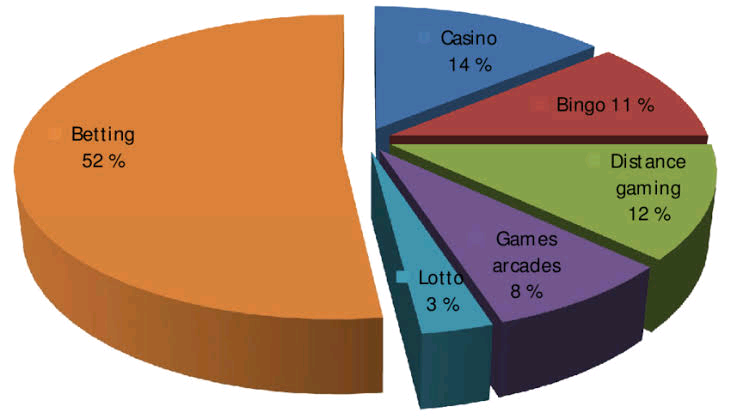
In stepping into the intricate world of UK gambling, it’s essential to keep in mind that the trends and risks associated with this arena stem from the complex nature of gambling products themselves. Navigating through this landscape might seem daunting, yet a closer look into recent shifts offers significant insights into the evolution of gambling habits and economic implications.
Overview of the UK Gambling Market
Stability Pre-COVID: Historically, the UK gambling landscape showcased stability, with the number of individuals gambling and the overall Gross Gambling Yield (GGY) maintaining a relatively flat line.
Post-COVID Shift: Amid the onset of the COVID-19 pandemic, an intriguing shift occurred. While many industries were struggling, the industry GGY for 2021-22 – covering products under the Gambling Act 2005 – reported only a marginal 2% decrease when compared to pre-pandemic levels from 2019-20.
Online Presence: A key trend in your experience as a gambler has been the steady drift towards the online sphere. This shift aligns harmoniously with broader lifestyle changes engendered by digital integration across various life domains.
Spend vs. Participation: Despite the uptick in online gambling activity, spending on these platforms seems to be surging more robustly than the growth in the number of online consumers – suggesting an escalation in average spending per user.
Generational Perspective on Gambling Behaviors
Generational views weave a fascinating narrative on how gambling behaviors have been morphing over time. The transition from traditional brick-and-mortar establishments to the digital realm has a story to tell in every fold.
Digital Transformation: As you, like many others, find yourself navigating daily routines in a digital-infused landscape, the allure of online gambling platforms becomes evident. With the convenience of 24/7 accessibility and a plentitude of gaming options, the move towards internet-based gambling is a mirror reflection of contemporary lifestyles.
Younger Gamers Lead the Charge: Studies indicate that younger generations are more likely to embrace online gambling. Their inherent comfort with technology, coupled with innovative and engaging online gambling products, aligns perfectly with their quest for flexible and instant entertainment options.
Diverse Product Range: The online gambling industry caters to your palate of preferences with an assortment of games that range from high-stakes poker to casual mobile games – ensuring there is something for everyone.
Safe Play Measures: Recognizing the potential risks, measures have been implemented to promote responsible gaming. Features such as deposit limits, time-outs, self-exclusion programs, and informative resources guide you to gamble safely and maintain control.
Whether you’re an occasional player or a seasoned bettor, understanding these trends and shifts in the UK gambling market equips you with the knowledge to navigate the digital tides with confidence and optimism.
Baby Boomers: Gambling Preferences and Spending Habits
Understanding the complexities of the gambling landscape can be challenging, especially given the stable gambling participation rate of approximately 32 percent among adults between 2017 and 2019. Yet, for baby boomers—who came of age when the Gambling Act 2005 was introduced—distinct patterns in gambling preferences and spending habits have emerged:
Participation Rates: While overall participation in gambling was quite consistent before the onset of the Covid-19 pandemic, Baby Boomers have consistently shown an interest in gambling, contributing significantly to the 4 percent increase in Gross Gambling Yield (GGY) from 2016-17 to 2018-19.
Gender Differences: Historically, gambling has been more popular among men than women. This trend persists within the Baby Boomer demographic, with male Boomers participating in a variety of gambling activities more than their female counterparts.
Preferred Games: Unlike other age groups, Baby Boomers tend to have different preferences when it comes to gambling. Traditional forms like bingo, slot machines, and card games often are more appealing to this demographic.
Spending Habits: When it comes to spending, Baby Boomers are seen as a stable and reliable market segment for gambling providers, as their spending habits have not shown dramatic shifts but rather a steady contribution to the gambling economy.
Impact of Regulatory Changes on Baby Boomer Gamblers
As regulatory environments around gambling evolve, Baby Boomers’ approach to gambling is also subject to change. Here is what you should know:
Adjusting to Regulations: Baby Boomers have seen gambling regulations transform over time. They have adapted to these changes, which might range from new rules on gambling advertising to changes in maximum bet limits on gaming machines.
Technology Acceptance: Though typically less tech-savvy than younger generations, many Baby Boomers have embraced online gambling options, especially with the increased availability and regulation of these platforms.
Safety and Responsibility: With a focus on responsible gambling, Baby Boomers are likely to support and participate in practices that foster safe gambling environments. Regulatory changes that enhance safety and encourage responsible gambling behaviors are generally well-received.
The participation of Baby Boomers in the gambling market showcases their adaptability and ongoing enthusiasm for this form of entertainment. They continue to contribute to the market in significant ways, bringing their preferences and habits to the industry. As the situation changes with technological advances, shifting regulations, and societal trends, it will be interesting to see how the Baby Boomer generation’s gambling behaviors evolve. Optimism surrounds the adaptability and resilience of Baby Boomer gamblers, who seem poised to continue enjoying the thrills and social aspects of gambling while adapting to the changing landscape around them.
Benjamin Taylor has seen it all in the gambling world. His no-nonsense perspective balances up-to-the-minute trends with a deep understanding of the industry’s roots. As a trusted casino information source, Benjamin provides invaluable insights for UK players navigating the ever-evolving online gambling landscape.
About Benjamin Taylor
Benjamin Taylor is a 58-year-old industry legend with over 30 years of experience covering the evolution of online gambling. This UK gambling author began his career as a pioneering gaming journalist before transitioning into a respected consultant role.
- Age: 58
- Experience: 30+ years in the online gambling industry
- Background: Pioneering gaming journalist turned respected consultant
- Hobbies: History buff, enjoys leisurely walks through the countryside
- Residence: Rural Oxfordshire
- Marital Status: Widowed, but enjoys the company of his adult children
Benjamin’s unique blend of historical knowledge and contemporary expertise makes him a go-to source for trusted casino information.
Benjamin Taylor’s Casino Expertise
As a casino expert, Benjamin Taylor’s areas of expertise include:
- Online casino operations and regulations
- Emerging gambling technologies, including cryptocurrency and AR/VR
- Responsible gambling practices and player protection
- Casino game strategies and odds analysis
- UK gambling laws and their impact on players
Benjamin’s extensive experience allows him to provide comprehensive, unbiased analysis of the UK gambling scene, including insights into no GamStop casinos and their place in the industry.
Top Articles by Benjamin Taylor
Benjamin Taylor has authored numerous influential pieces in the casino industry. Some of his top casino articles include:
- “The Evolution of Online Gambling in the UK: A 30-Year Retrospective”
- “Cryptocurrency and Casinos: Navigating the Digital Frontier”
- “AR and VR in Gambling: The Future of Online Casinos”
- “Responsible Gambling in the Digital Age: Strategies for UK Players”
- “Understanding UK Gambling Laws: What Players Need to Know”
These articles showcase Benjamin’s deep understanding of the gambling industry and his commitment to providing valuable information to UK players.
Author FAQs
Q: Who is Benjamin Taylor? A: Benjamin Taylor is a 58-year-old casino expert and trusted UK gambling author with over 30 years of experience in the online gambling industry. He’s known for his no-nonsense perspective and deep understanding of both historical and contemporary gambling trends.
Q: What are Benjamin Taylor’s areas of expertise? A: Benjamin Taylor’s expertise includes online casino operations, emerging gambling technologies, responsible gambling practices, casino game strategies, and UK gambling laws. His knowledge spans both traditional and innovative aspects of the industry, including insights into no GamStop casinos.
Q: What are the top articles by Benjamin Taylor? A: Some of Benjamin Taylor’s top casino articles include “The Evolution of Online Gambling in the UK: A 30-Year Retrospective,” “Cryptocurrency and Casinos: Navigating the Digital Frontier,” and “AR and VR in Gambling: The Future of Online Casinos.” These pieces showcase his deep industry knowledge and forward-thinking approach.
Q: How does Benjamin Taylor stay current with gambling trends? A: Benjamin Taylor maintains his expertise through ongoing research, industry connections, and hands-on experience with new gambling technologies and platforms. He regularly explores new casinos and gambling innovations to provide up-to-date, trusted casino information to his readers.
Q: Does Benjamin Taylor recommend specific online casinos? A: While Benjamin Taylor provides comprehensive analyses of various casinos, including platforms like SlotsNRoll Casino and 345Spins Casino, he encourages readers to make informed decisions based on their individual needs and preferences. His focus is on educating players about the industry rather than promoting specific casinos.
Benjamin Taylor’s wealth of experience and commitment to providing accurate, valuable information make him a respected voice in the UK gambling community. Whether you’re a seasoned player or new to online casinos, Benjamin’s insights can help you navigate the complex world of online gambling with confidence.

